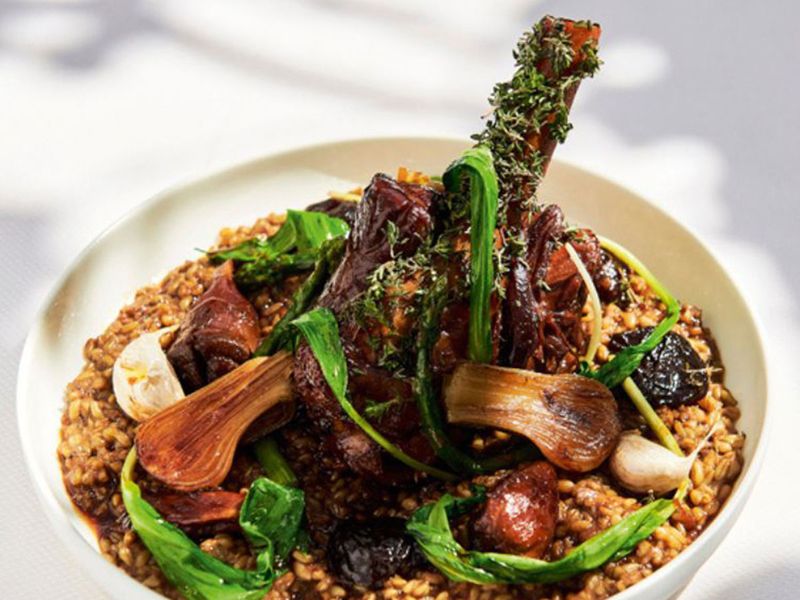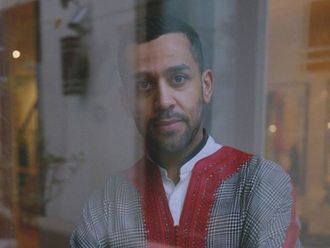
Being nurtured in a family of restaurateurs, Yasmina Hayek has always regarded food as an intrinsic part of her life and the broader Lebanese culture. As a young, skilled, and versatile chef, Yasmina brings a unique blend of experience, combining her role within the expanding and thriving family business with academic and professional training gained at some of the world’s finest -culinary institutions and establishments.
Yasmina, the Executive Chef at SGR Group, the holding company of the renowned Em Sherif Restaurant based in Beirut, shares with The Kurator her contributions to the growth of the Em Sherif family business, her implementation of an avant-garde vision, her special bond with her mother Mireille Hayek (the founder of Em Sherif Restaurant), and her ambitious plans for expansion. Additionally, Chef Yasmina shares one of her traditional recipes.
Was it destiny or passion that led you to join the Em Sherif family business?
YASMINA HAYEK Before joining my family business, I wanted to be a doctor. I did a French Baccalaureate, Scientific Baccalaureate, and an internship in genetics. But then I realised that this field wasn’t for me. My mom gave me the freedom to choose and do whatever I wanted in life. Then, I pursued my studies at Paul Bocuse in France and it was an amazing experience. Cooking blends the best of both worlds, it’s a happier lab for me than being in a hospital and I definitely don’t regret my choice.
How did your previous experiences as a chef shape your skills and contribute to the essence of Em Sherif?
It was very inspiring for me to have the Michelin starred experiences whether it was in France or Copenhagen. I came back to Beirut in 2017 and I was working with my family in our previous restaurant. But then Covid hit, and the blast happened, I got very injured, so I took the decision to pursue my studies again and I did my masters in food design in Milan. All these different experiences helped me a lot in growing our family business, and I officially joined the family business after my master’s degree.
In what ways has working with your mother contributed to the success of Em Sherif, and how do your strengths complement each other?
When I came back to Lebanon, I wanted to kind of impose my style, my mom and I used to clash as well. But then I quickly understood my mom’s experience and the great things we could take from her and I realised that I had to follow my mom’s path. We found the right balance where we saw what works and what doesn’t. Today, I accomplished my mission.
Could you elaborate on how you’ve implemented your new vision into the restaurant and the specific changes you’ve made?
I introduced a lot of French techniques from my previous experiences abroad which allowed the Lebanese food to be more upscale and more interesting. This is why Em Sherif is different but still very authentic. For example in Monaco or in Europe, it was very challenging for us to change the perception of how people see Lebanese food. So, we tried to do our best to work on different techniques to mix and bridge the East with the West.
Can you share some of the most challenging moments you’ve encountered along the way?
Every opening is a challenge. One of the biggest challenges for me was opening the Deli in London. Facing the whole board of Harrods was scary and my mother wanted me to do it so it was interesting! Monaco was also my first opening by myself, which was also a very challenging experience. Every day is a challenge to make sure the food is great, consistent, to make sure the final product is up to the standards of Em Sherif and up to people’s expectations.
As a chef, what inspires you the most, and what continues to fuel your passion?
Environment, history, and for me especially now our innovation depends a lot on our history because you have to go back to the past to be able to move forward. Trying new ideas is also something that excites me.
What sets the Beirut branch of Em Sherif apart from others in your chain?
Beirut is the essence, it’s where it all started. We are very present in Beirut more than we can be anywhere else in the world, and of course presence makes a very big difference.
Please explain the distinction between the different concepts of Em Sherif and how this idea came about.
We have three concepts of Em Sherif and soon to be four. Em Sherif started as a fine dining restaurant back in 2011, it had only a set menu. Then came Em Sherif Café, my mother wanted to create a more casual format to Em Sherif that’s opened from breakfast and serves until dinner. It’s mainly casual Lebanese food. The Sea Café is mainly focused on sea food. Em Sherif Deli is a grab and go concept.
How do you adapt your cuisine to cater to the tastes of clients in the region compared to other parts of the world?
We always adapt wherever we are in the world. Some cultures prefer to have more spicy food, some people prefer less acidic foods. Some cultures prefer meats that are well cooked and don’t have any preferences for raw foods. We adapt our menus depending on where we are implemented in the world.
With your remarkable expansion in the region, how do you assess this milestone, and do you have any plans for further global expansion?
We are so proud of being able to do it so far, we try to be as present as possible. We go to all openings, so consistency is the key for us. We really plan on making every opening very successful because our client satisfaction is what matters because they represent Em Sherif worldwide. Yes, we are opening in Madrid, Armenia, Morocco, Paris, Brazil, and a second outlet in London.
The Kurator special

Freekeh
- 500 grs of freekeh
- 50 grs of butter
- 20 grs of olive oil
- 100 grs of onions
- 1 tsp of cinnamon
- 1 tsp of sweet pepperp owder
- 2 tsp of salt
- 1,5L of stock
- (lamb, beef, vegetable)
- 1 bay leaf 2 branchesof thyme
Lamb shank
- 2 pcs of lamb shank
- 5 branches of thyme
- 1 branch of sage
- 2 onions cut in 4
- 2 chopped carrots
- 1 garlic head
- 1 cinnamon stick
- 2L of water
- 2 tsp of salt
Toppings
- medjool dates
- swiss chard
- pearl onions
- chives or any seasonal vegetable
The preparation
- Cook the lamb shank: sear the lamb shank for a rich colour, sauté vegetables, herbs and spices then add watert o cover
- Cook in a hot oven for three hours or until lamb shank easily separates from the bone, then allow it to cool in its cooking water
- Cook the freekeh: heat the olive oil and sauté the onions
- Add the spices
- Roll the freekeh, water it, and proceed with cooking
- After cooking the freekeh, add the pitted dates into the mixture
- Sauté the onions in a butter cube and stock until they become tender.






